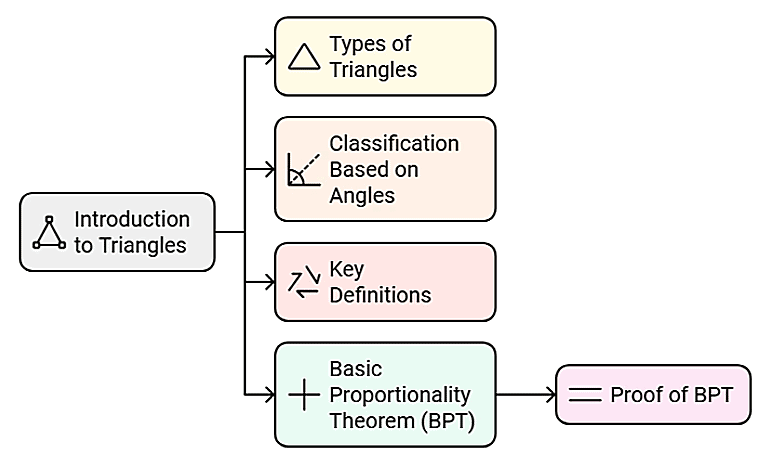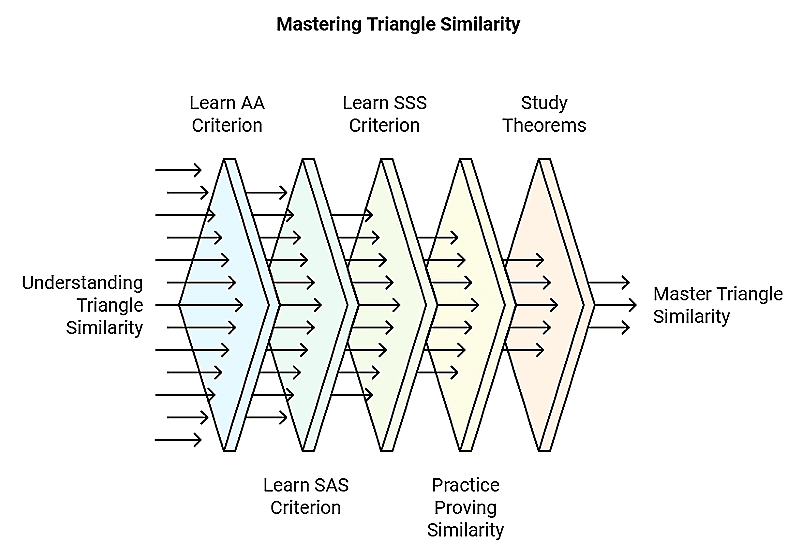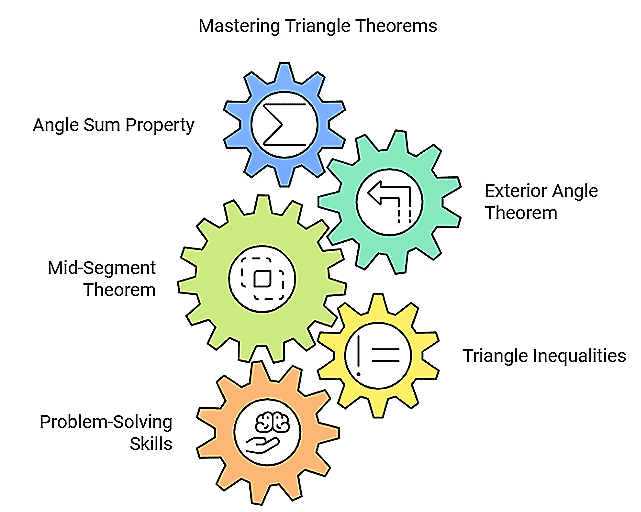4 Days Timetable: Triangles | Mathematics (Maths) Class 10 PDF Download
The "Triangles" chapter in your Class 10 Mathematics syllabus is a fundamental and indispensable part of your board exam preparation. Understanding triangles and their properties is not just crucial for mathematics but also has practical applications in various fields, including geometry, engineering, and architecture. This chapter lays the foundation for advanced mathematical concepts, making it essential for your academic journey.
This study plan is designed to help you efficiently master the "Triangles" chapter. It follows a structured approach, spanning four days of dedicated study and one additional day for revision. While you can adjust the timetable according to your pace, the order of topics remains the same.
Topics to Cover
Before delving into the study plan, let's review the topics we need to cover in this chapter:
- Introduction: Understand the significance of the "Triangles" chapter in the Class 10 board exam.
- Similar Figures: Explore the concept of similar figures and understand how to identify and work with them.
- Similarity of Triangles: Learn about the similarity of triangles, including criteria and properties.
- Criteria for Similarity of Triangles: Dive into the criteria that determine whether two triangles are similar.
Day 1: Introduction, Definitions, and Basic Proportionality Theorem (BPT)
What to Cover:
- Introduction to triangles, types of triangles (scalene, isosceles, equilateral), and classification based on angles.
- Key definitions.
- Basic Proportionality Theorem (BPT) and its proof.

Study Tips:
- Begin by watching the Introduction and Basic Proportionality Theorem Video to understand the concepts visually.
- Go through the Chapter Notes: Triangles and the Important Definitions & Formulas to ensure you grasp the basic terminology.
- Practice NCERT Solutions: Exercise 6.1 to test your understanding of BPT.
Day 2: Criteria for Similarity of Triangles
What to Cover:
- Study the three similarity criteria: Angle-Angle (AA), Side-Angle-Side (SAS), and Side-Side-Side (SSS).
- Practice proving triangles similar using these criteria.
- Go over the proofs and applications of theorems related to similarity.

Study Tips:
- Review the NCERT textbook for a comprehensive understanding.
- Watch the Similarity Criteria Video to understand how to apply the criteria in various problems.
- Refer to the NCERT Solutions: Triangles (Exercise 6.2) for additional practice.
- Use the Flashcard: Types of Triangles for a quick review.
Day 3: Important Theorems and Problems Related to Triangles
What to Cover:
- Explore important theorems like the Angle Sum Property of a triangle, Exterior Angle Theorem, and their applications.
- Focus on problems involving mid-segment theorem and inequalities in triangles.
- Apply these theorems in various exercises to develop problem-solving skills.

Study Tips:
- Watch the Properties and Parts of Triangles Video to get a clear understanding of the key properties and theorems.
- Work through NCERT Solutions: Triangles (Exercise 6.3) to practice problems related to theorems.
- Use Short Notes: Triangles for a quick review of important theorems.
Day 4: Revision
On this day, focus solely on revision. Go through the key concepts, formulas, and solved examples from your class notes and the NCERT textbook.
What to Cover:
- Solve Previous Year Questions: Triangles to familiarize yourself with exam patterns.
- Work on Practice Test: Triangles to test your knowledge across all sections.
- Practice Important Questions and Assertion & Reason Test to ensure a solid grasp of the chapter.
Study Tips:
- Focus on solving a variety of problems to ensure complete understanding.
- Use the Important Questions: Triangles to gauge your readiness for more difficult problems.
- Go through Worksheet: Triangles for additional practice.
Final Tips:
- Consistency: Stay consistent in your practice to fully master theorems and their applications.
- Revision: After completing the four-day plan, use the fifth day to revise everything by reviewing your notes and solving any remaining practice questions.
- Utilize resources: Make full use of the provided videos, flashcards, and additional notes to strengthen your understanding.
By following this structured study plan and utilizing all the resources available, you can confidently tackle the chapter on "Triangles" and excel in your exams.
Remember that practicing different types of questions is crucial for success in the Class 10 board exams. If you find any topic challenging, revisit it and solve more related questions to improve your grasp.
By following this study plan and utilizing the resources mentioned, you can prepare effectively for the "Triangles" chapter in Class 10 Mathematics and excel in your board exams.
Don't forget to balance your study schedule across all subjects. You can access study timetables for your other subjects on Class 10 Boards.
Here are all the important links and topic links for the "Triangles" chapter:
Chapter: Triangles
Study Material and Notes:
Past Year Questions:
NCERT Solutions:
RD Sharma Solutions:
Practice Questions and Tests:
- Short Answer Questions
- Practice Questions: Triangles
- Case Based Questions: Triangles
- Assertion and Reason Type Questions
- HOTS Questions: Triangles
Topic-wise Test and Worksheet:
These resources should cover all the aspects of the "Triangles" chapter in your Class 10 Mathematics syllabus, helping you prepare thoroughly for your board exams.
Best of luck with your studies!
|
127 videos|584 docs|79 tests
|
FAQs on 4 Days Timetable: Triangles - Mathematics (Maths) Class 10
| 1. What is the Basic Proportionality Theorem (BPT) and how is it applied in triangles? |  |
| 2. What are the criteria for similarity of triangles? |  |
| 3. What are some important theorems related to triangles that should be studied? |  |
| 4. How can students effectively revise the concepts related to triangles? |  |
| 5. What types of problems can be expected in exams related to triangles? |  |






















